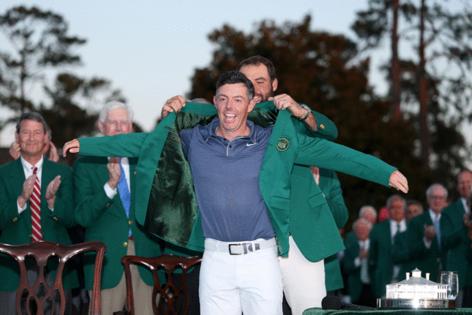Jason Mackey: Cell phone policy at Masters should serve as a call for all of us to review our habits
Published in Golf
PITTSBURGH — The images from Augusta National on Sunday were nothing short of stirring, the palpable emotion when Rory McIlroy hugged his longtime caddie and best friend (Harry Diamond) and the relief felt when McIlroy dropped to his knees (and elbows) on the 18th green, a Masters champion at last.
And those were only photos from Ken Griffey Jr., who's apparently not just really good at baseball.
My favorite pictures from the Masters, however, did not make this list. In fact, they probably didn't make any list of the best photos because what grabbed me occurred in the background.
Fans actually watching the game.
Amazing, isn't it?
Not everyone holding their phones aloft, pinching in and out to try and snap something that won't be anywhere near as good as professional versions readily available online. Or, like so many of us at sporting events, mindlessly scrolling and scrolling. Like the ticket didn't just cost way too much money.
Augusta has a strict policy prohibiting cell phones, and I think it's incredible. It's something every professional sports team or league should take notice of and try to implement, at least once a year as a reminder to all of us to put our phones down more than we do.
I'm certainly guilty.
As sports writers, we have the absurd privilege of going to games for free and getting paid to write about them. And too many of us — again, my hand is raised — wind up screwing around on social media or researching something or texting. Stop it. We're missing out.
Augusta National does this to preserve tradition, the same as its unique verbiage or concession-stand prices. I knew this, but I'm not sure it ever grabbed me the way it did last week.
"I just don't think it is appropriate," former club chairman Billy Payne said of the policy in 2017. "The noise is an irritation to not only the players ... the dialing, the conversation — it's a distraction."
Before the tournament started, Ludvig Aberg was asked about the policy and said he was a big fan. That the patrons — what fans are called there — create a different vibe around the course when they're less distracted.
"It makes it feel like they're so much more engaged," Aberg said. "It's a lot more eye contact with the fans. ... You can really tell that they watch and appreciate good golf."
There are medical reasons to limit our cell phone usage, as well.
Last year, the National Education Association conducted a survey of 2,889 members working in elementary, middle and high schools. Attributing the following to social media and personal-device use, over 90% of educators felt students' mental health is a serious issue at their school.
Again, I'm not trying to lecture here. It's a reminder for me, too.
But shouldn't we be modeling better behavior? Because it's obviously not just teenagers who could stand to scale back.
Four years ago, the Journal of Mental Health and Clinical Psychology linked cell phone usage to various forms of addiction, including preoccupation, productivity loss and feeling lost or anxious.
Good thing nearly 60% of Americans admitted to being addicted to their phone and checking it an average of 144 times per day, according to a 2023 poll in PC Magazine.
That's why I loved those Masters photos that didn't include a single cell phone, just people staying in the moment, enjoying the incredible golf, remembering that former generations lived like this for a long time before a bunch of geniuses decided that we needed an app for everything.
I want more of the simplicity, the mindfulness that's possible without endless (and, most of the time, stupid) distractions.
With eight or nine home NFL games, plus the proliferation of sports betting, I'm well-aware this probably won't happen with football. But over 162 games, I don't see why the Pirates couldn't have a few nights intentionally free of cell phones — and yes, I'm sure there are bound to be jokes.
But in all seriousness, wouldn't that be great? I'd go — and I actually wouldn't mind stripping the whole thing down a little more.
As someone who's extremely noise-averse and has probably lived most of my life with undiagnosed ADHD (or more), I struggle with the audio and video barrage that occurs at sporting events. I also miss the days when a baseball game was a baseball game — the dead air, the quiet of a summer night and some occasional organ music.
Now, in hockey, you can feel the music in your ribs. There are kids wearing headphones (and I don't blame the parents). Nearly every pitch in baseball requires some sort of prompt, and the screaming by in-arena hosts during breaks in the action ... yeah, a throwback, strip-it-down sort of night would be nice.
I do worry about the logistics here, though. How could the Penguins or Pirates prevent fans from entering with a cell phone? Somebody would inevitably skirt it or throw a fit.
They'd also have to set up banks of landlines like they have at Augusta National, though it wouldn't be the first time the Pirates acquired something out of date at a discount.
Jokes aside, there's a lesson to be learned from what transpired at the Masters: Put the damn phones down.
Whether you're driving, playing with your kids, in school or on the 18th green — perhaps at the U.S. Open in June — trust me, it can wait. It's much more enjoyable to live in the moment.
____
© 2025 the Pittsburgh Post-Gazette. Visit www.post-gazette.com. Distributed by Tribune Content Agency, LLC.







Comments